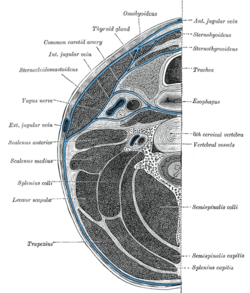Deep cervical fascia
| Deep cervical fascia | |
|---|---|

Section of the neck at about the level of the sixth cervical vertebra. Showing the arrangement of the fascia coli.
|
|
| Dorlands /Elsevier |
l_05/12480348 |
|
Anatomical terminology
[]
|
|
The deep cervical fascia (or fascia colli in older texts) lies under cover of the platysma, and invests the muscles of the neck; it also forms sheaths for the carotid vessels, and for the structures situated in front of the vertebral column. Its attachment to the hyoid bone prevents the formation of a dewlap.
The investing portion of the fascia is attached behind to the ligamentum nuchæ and to the spinous process of the seventh cervical vertebra.
The alar fascia is a portion of the deep cervical fascia.
The deep cervical fascia is often divided into a superficial, middle, and deep layer.
The superficial layer envelopes the trapezius, sternocleidomastoid, and muscles of facial expression. It also contains the submandibular and parotid salivary gland as well as the muscles of mastication (the masseter, pterygoid, and temporalis muscles).
The middle layer envelopes the strap muscles (sternohyoid, sternothyroid, thyrohyoid, and omohyoid muscles). It also surrounds the pharynx, larynx, trachea, esophagus, thyroid, parathyroids, buccinators, and constrictor muscles of the pharynx.
The deep layer is the pre vertebral fascial layer and surrounds the paraspinous muscles and cervical vertebrae.
Above, the fascia is attached to the superior nuchal line of the occipital bone, to the mastoid process of the temporal bone, and to the whole length of the inferior border of the body of the mandible.
Opposite the angle of the mandible the fascia is very strong, and binds the anterior edge of the Sternocleidomastoideus firmly to that bone.
Between the mandible and the mastoid process it ensheathes the parotid gland—the layer which covers the gland extends upward under the name of the parotideomasseteric fascia and is fixed to the zygomatic arch. It also contributes to the sheath of the digastric.
...
Wikipedia
